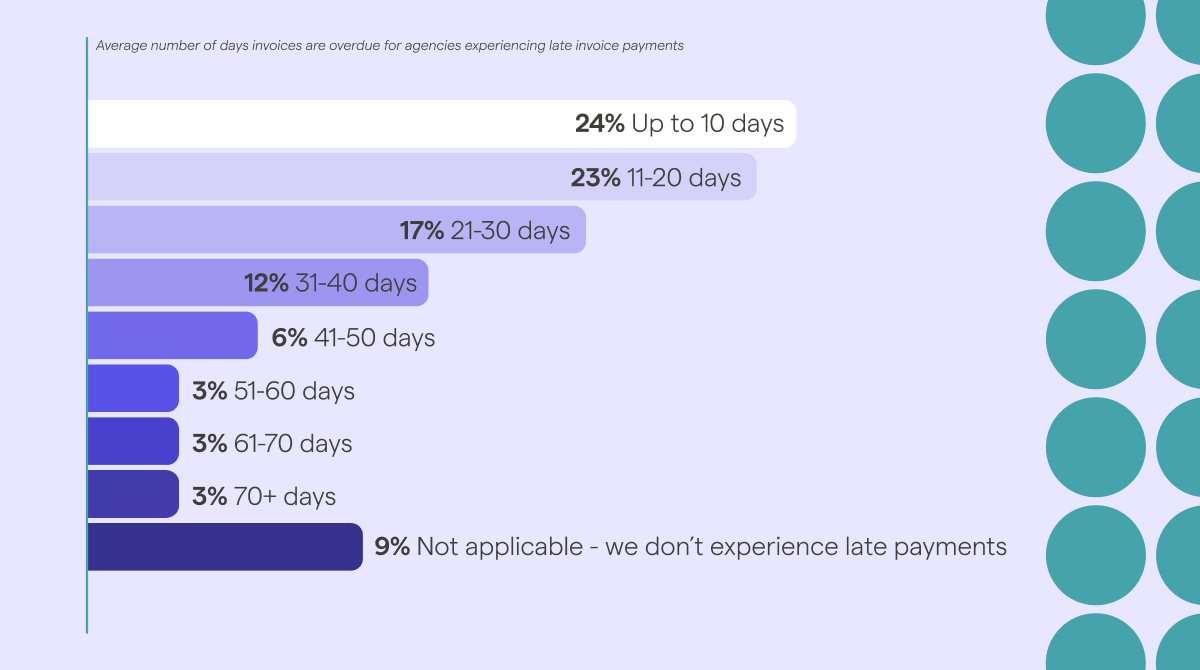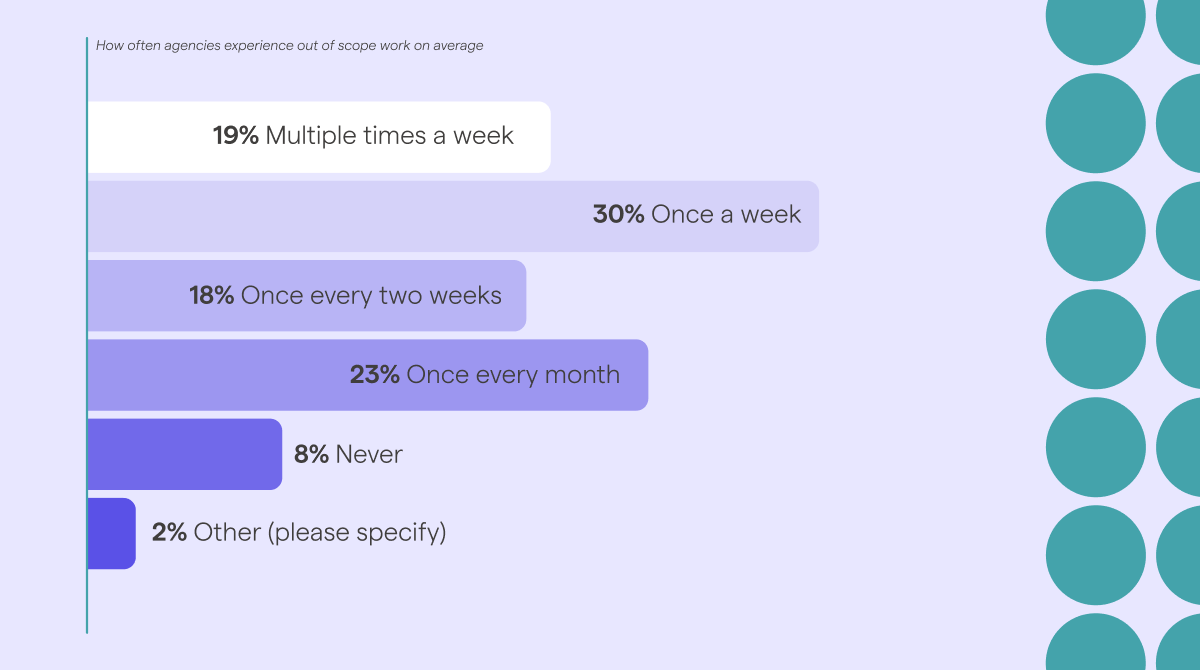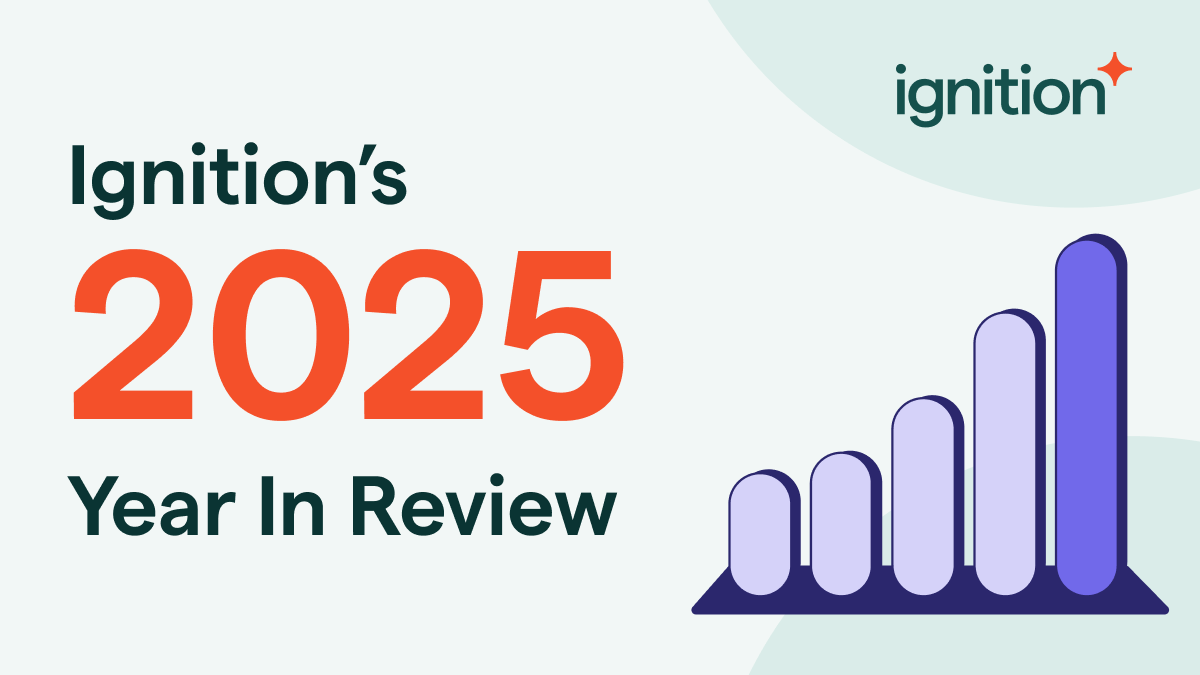How to avoid late payments and over-servicing clients

It’s no secret that late client payments, over-servicing clients, and doing out of scope work is a challenge facing many professional services businesses, from accounting firms to consulting and marketing agencies. Whether you run an advertising, digital, social media, PR or creative agency, chances are you’ve had to write off an unpaid invoice, do extra hours of work, or additional project scope just to keep your clients happy.
All of this comes at a business cost, so Ignition asked over 220 agency leaders in the advertising and marketing industry in the US how these issues were directly impacting their business. While the results are perhaps not surprising, it highlights a big opportunity for agencies to fundamentally change the way they do business with clients to improve cash flow and maximize profitability and revenue opportunities. Let’s start by diving straight into the top survey findings and what your agency can do to mitigate the impacts.
Around 91% of agencies experience late invoice payments
Let’s face it – nobody likes chasing clients for payment. While the frequency may vary, our survey shows that around 91% of agencies say they experience clients paying invoices late.
For agencies experiencing late payments, around 23% say their invoices are typically between 11 to 20 days overdue, while 17% are paid 21 to 30 days after the due date. This makes cash flow management challenging, especially for smaller agencies

While it’s easy to point the finger at clients for this ‘bad’ behavior, it also comes down to the way agencies inherently bill and get paid for their work. Having started my career in a small communications agency, I had the pleasure of juggling client work with helping manage invoicing and payments. Rest assured, invoices were often sent late, and follow up with clients dually avoided unless absolutely necessary.
While you can always ask for an upfront deposit before you start the work to alleviate the anxiety of cash flow, that doesn’t necessarily fix the underlying problem of getting paid late. To drive meaningful change, agencies need to flip the script.
That starts with collecting clients’ payment details upfront before they can even sign your proposal. It gives your client the option to pre-authorize payments, while giving you certainty that you’ll always get paid. It’s no different from signing up for a gym membership, so why shouldn’t agencies ask the same of their clients?
Next is ensuring that you’re billing upfront, before the work even starts, and automating your billing and invoicing, so invoices are sent on the due date based on your billing schedule. The final step is automating your payment collection, especially for recurring retainer work, so that neither you nor your client have to even get involved in the process.
While that may sound all too hard, it’s not as hard as you think to free your agency from the burden of late payments.
Since implementing Ignition’s automated proposal, billing and payment software, Viraaj Solanki, Founder of Digital Tank Marketing Agency, has reduced his billing-related workload to just two hours per month, and improved cash flow. “As we all know – running a business or doing anything in the jobs we do – time is valuable. We’ve got to maximize our time,” he said. “I've saved a lot of hours. I'm less stressed and I'm able to focus on my team.”
Similarly, by adopting Ignition’s pre-authorized payment system, Laurianne Lachapelle, Director of Finance, Talent, and Culture at Code Marketing, has not only streamlined agency operations and reduced accounts receivables, but also offered small business clients an easier way to manage payments.
"The fact that we have this option for those types of businesses, it's something that we were looking forward to [offering as] an option to those busy businesses that won't have this administrative time," she said. “We can also budget better… It's very easy to see the cash flow coming in when you use Ignition for most of your clients. So, that's helped us a lot with the financial management of the organization as well.”
Watch the webinar: How I automated my marketing agency to be paid on time, every time
Around 92% of agencies experience out of scope work
Keeping scope in check is the next challenge facing many agency owners that Ignition surveyed, with around 92% experiencing out of scope work (clients requesting work outside the current scope of project, initiative or program). Around 49% of agencies experience out of scope work at least once a week, with over 19% saying this happens multiple times a week.

When we asked agency owners and leaders how much unbilled out of scope work costs them each month, just 7% said they always bill clients for work that’s out of scope. That means around 93% are potentially leaving money on the table by not charging clients for additional work. In fact, around 16% of agencies estimate that unbilled out of scope work is costing their business between $5,000 to $10,000 per month; a further 14% say it costs them between $10,000 to $20,000 per month.

While we didn’t delve into the reasons why agencies don’t charge for all of their work, the findings point to some clients simply being conditioned to not want to pay for it. Around 24% of agencies experience clients not wanting to pay for out of scope work all the time, while 33% say this happens sometimes.

Having worked both agency and client side, I know I’ve certainly been guilty of both. On the agency side, there’s a desire to always keep the client happy. What starts off as a one-off exception to accommodate additional work, becomes an unsustainable habit. On the client side, what starts off as an innocent one-off out of scope request, becomes an unreasonable expectation for the agency to continually do more.
So how do you ensure your agency is paid for every piece of client work you do?
Start by setting clear expectations and boundaries with your clients from day one. While charging for additional work can potentially be a challenge regardless of your pricing model, there are some small incremental steps your agency can start taking to help safeguard profitability.
For example, when you send a client proposal that outlines your scope of work and deliverables, consider making a provision for any additional work or scope changes upfront. By including a provisional line item in your proposal that clearly outlines you’ll charge clients for additional scope, you’ll be indicating to new clients that ad hoc requests don’t always come for free. Once they sign your agreement, you’ll have a single source of truth you can refer to, to make sure you and your clients are on the same page. It means you can have an open, and honest conversation about out of scope requests, and renegotiate the existing scope if it means some deliverables need to be swapped to make way for new ones.
This is where proposal, billing and payment automation software like Ignition has helped many advertising and marketing agencies bill and get paid for all of their work. For example, Ignition enables you to make adjustments to active services after a proposal has been accepted including the description, price, quantity, and billing details.
That way, when things change, you can simply adjust the scope and pricing for agreed services to make sure you bill clients for any out of scope work and don't lose out on potential revenue.
92% of agencies over-service clients

While I’m by no means suggesting there’s a golden wand to ‘auto-magically’ fix over-servicing, it’s worth delving into some of the underlying contributors. We’ve already talked about not charging for out of scope work as one of the culprits, but there’s a chance your agency is also under-valuing its services.
I’ve certainly been guilty of not accurately pricing fixed fees for project work or monthly retainers. If over-servicing is a recurring theme for your agency, it’s an opportunity to take a step back and ask yourself: ‘Am I devaluing the services I provide?; do my prices reflect my worth?; do my terms specify additional fees for out of scope work?'
Just because over-servicing clients has become somewhat of an industry norm, doesn’t mean it has to be in the future, regardless of the services your agency provides. While I no longer work in an agency, the survey results have certainly made me reflect on how I can better play my part in the fair exchange of value when dealing with our agency partners.
Top three agency challenges in 2023: Pricing, budgets and competition
So what’s keeping agency owners and leaders awake at night in 2023? Our final survey question delved into the top three challenges facing agencies over the next 12 months, with pricing pressures (55%), operating on leaner budgets (52%) and staying competitive (48%) coming out on top. Around 44% of agencies also say retaining clients is a top challenge this year.

Amidst pricing pressures and leaner budgets in this economic uncertainty, it’s even more important than ever for agencies to charge and get paid for all of their work. Every item of unbilled work; every late client invoice; every hour of over-servicing adds additional pressure on your cash flow and bottom line.
Differentiating your client experience is also going to be critical to retaining clients. This isn’t purely limited to great service delivery and your client relationships. You need to make sure that the client experience is consistent across every single touchpoint. For Laurianne Lachapelle from Code Marketing, this meant using a proposal, billing and payment platform that allowed the agency to fulfill its promise of delivering top-tier services and prioritizing client success.
“[Ignition’s] proposal [functionality] helped us in many ways… one thing is the option that we have to add a brochure; to add a video; to add personalized elements, such as a personalized message at the beginning and also at the end of the proposal. These were some things that were very useful for us – to just have those little details that will really make an impact on our client,” she said.
In the midst of a more uncertain economic environment, it’s clear that agencies are grappling with the complex issues of revenue management and cash flow. This Ignition survey brings to light key areas of concern, such as late payments and unexpected out-of-scope work, and points towards potential areas for optimization. As we venture further into the year, we could view these challenges as opportunities for growth and refining processes to better navigate these complexities.
About the survey
In May 2023, Ignition ran a third party online panel survey of 223 owners, executives, VPs, and senior management from advertising, branding/design, creative, digital, marketing, media, social media, and PR agencies of all sizes in the United States. Sixty four percent of respondents had less than 50 employees, while 56% had less than 30 clients. The goal of the survey was to understand the extent of late payments, out of scope work and over-servicing clients and how this was impacting agencies. Survey results were rounded.
About the author
Kasia is Global Head of Product, Customer and Brand Marketing at Ignition. With 15 years plus global marketing experience, Kasia spent over five years working for tech PR and communication agencies in the UK, Australia and New Zealand early in her career. Her only regret is wishing that she had known about Ignition sooner to simplify how the agency engaged clients, billed and got paid. To find out how Ignition can help your agency get paid for all of the work you do, watch the online demo.



